
A 75-year-old grandmother-of-seven has met two men whose blood was used to save her sight to thank them after a lifetime of pain and discomfort.
Carolyn Frost, who lives with her husband Thomas, 78, a former chartered accountant, near Thornbury in Gloucestershire, has severe dry eye syndrome which means she does not naturally produce enough tears to keep her eyes moist, affecting her ability to see.
The “horrible” and “disabling” condition she has suffered with since she was a teenager means she would often “walk right past” people in the street because of her distorted and blurred vision and experience itchiness and a burning sensation in her eyes.
Carolyn, a mother-of-three, has had temporary relief with other treatments such as steroids in the past, but around a year ago she started using eye drops provided by NHS Blood and Transplant (NHSBT).
The eye drops, made from the plasma in blood from selected donors, help reduce her painful symptoms and enable her to see her children and seven grandchildren properly – and thanks to the donors, she feels she has been given “another chance”.
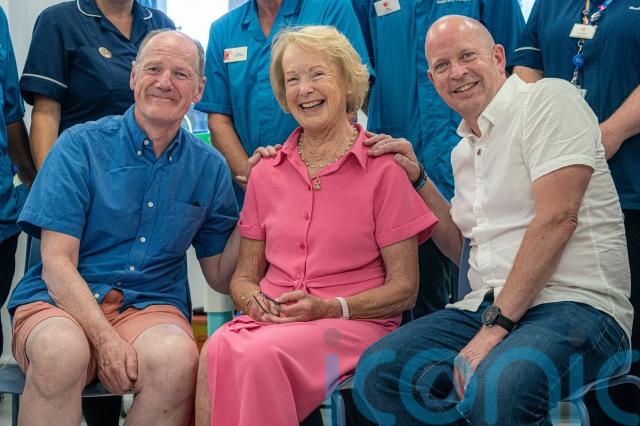
On Monday, Carolyn met the two donors whose blood was used to make her eye drops – Martin Wilson, 64, a retired Rolls-Royce engineer from Westbury-on-Trym, in Bristol, and Martin Darwin, 57, a renewable energy consultant from Newton-le-Willows, Merseyside.
Carolyn, a retired secretary, told PA Real Life: “The new eye drops are so soothing … it’s amazing that they can use blood to make them.
“They help me to just use my eyes without pain and it’s so nice to be able to see my family without it being so painful and difficult.
“I am just so grateful to the donors that they are giving somebody like me another chance and some comfort and making my life less uncomfortable.”
Describing meeting the donors, she added: “You never usually get to meet your donors, but it was amazing and humbling to meet them and say thank you.
“It has been a long journey with my eyes, but the eye drops are a blessing.”
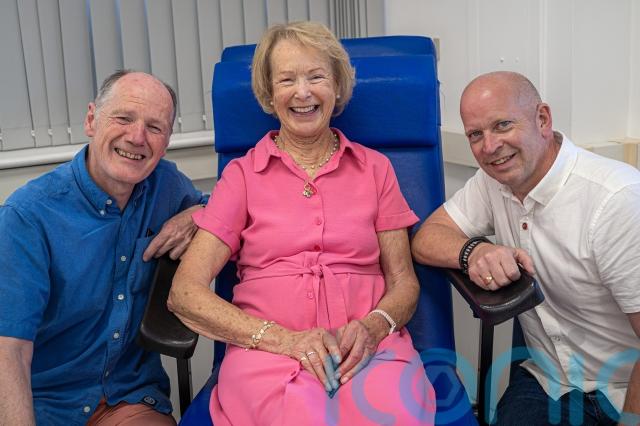
Carolyn has had dry eye since she was around 15 years old, with symptoms including red eyes, scratchy and burning sensations, and blurred vision.
She said it is a “horrible thing to have” and she has “really suffered” over the years.
“I can feel it burning hot sometimes. My eyes get hot, red and uncomfortable,” she explained.
“There’s a scratchy feeling and my vision is quite blurred. It becomes painful to use your eyes.
“It’s quite disabling. I really struggle to see, I am not allowed to drive, and I find it difficult to garden.
“People used to say I would walk right past them in the street.”
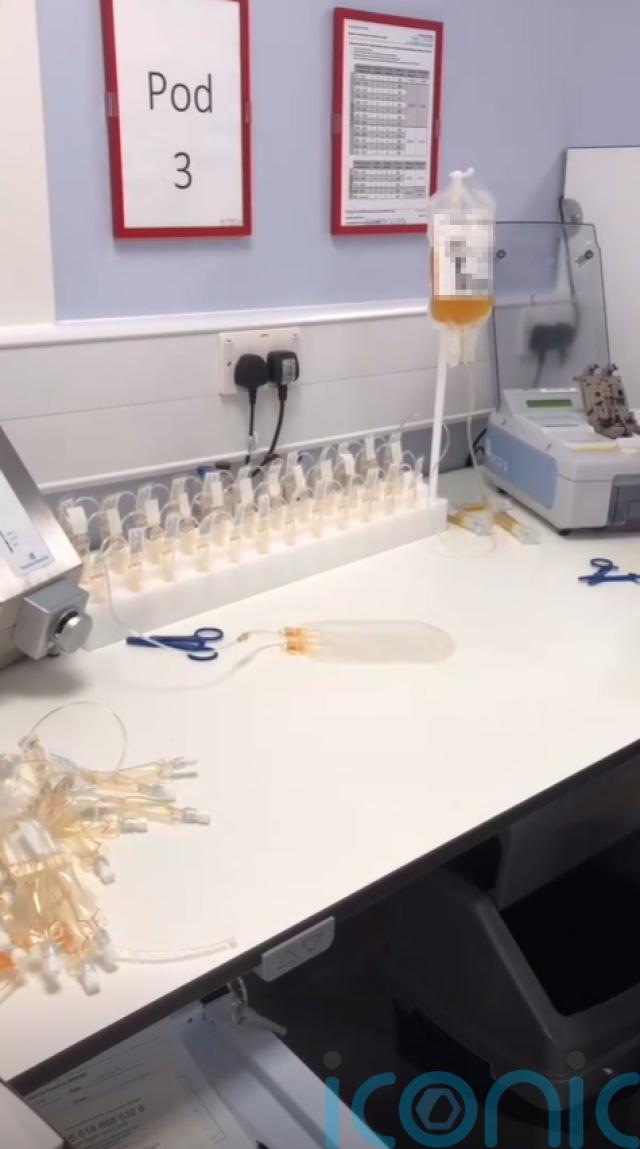
Dry eye syndrome can, in severe cases, cause extreme pain, sensitivity to light, infection and vision loss.
For Carolyn, she tried steroids along with an amniotic membrane – a biological bandage to heal or replace damaged eye tissue – but none of the treatments alleviated her symptoms for prolonged periods of time.
It was only after having a detached retina – when the thin layer at the back of the eye becomes loose – around a year ago, which made her symptoms worse, that she started using the NHSBT eye drops, and she said these were recommended to her by Omar Elhaddad, a consultant at Bristol Eye Hospital.
The “jelly-like” eye drops are kept in Carolyn’s fridge at home and made from donated blood – the blood is processed to separate out the serum, which is then diluted with saline.
Blood plasma serum can be used to make a replacement for tears for people who cannot make their own as it lubricates the eye and contains growth factors, proteins and vitamins, which can help surface eye health and healing.
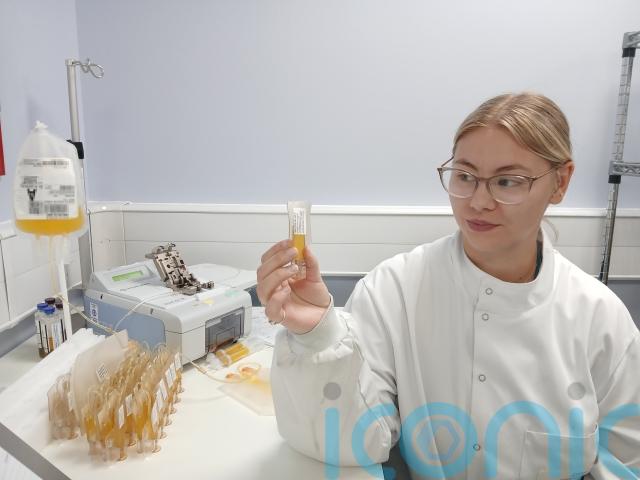
NHSBT said it only uses blood from male donors for the eye drops as plasma from females can have higher levels of human leukocyte antigen (HLA) antibodies and, if you transfuse that blood into someone, it could create a transfusion reaction damaging the lungs, which can be life-threatening.
Describing how the process works, Dr Akila Chandrasekar, a consultant in transfusion medicine at NHSBT, said: “Serum eye drops can be made from the patient’s own blood, however, around 80% of the patients who need this treatment rely on blood from volunteer donations.
“The blood donors attend the session and give blood in a normal way. Once blood is collected, it is allowed to clot.
“After 48 hours, the clot is removed and serum is separated and diluted to make eye drops.
“After all the quality checks are completed, the drops are sent directly to the patients and must be stored in their home freezer.
“They are advised to take one vial out every day and thaw before use. Each donation normally provides enough serum eye drops to last up to three to four months.”
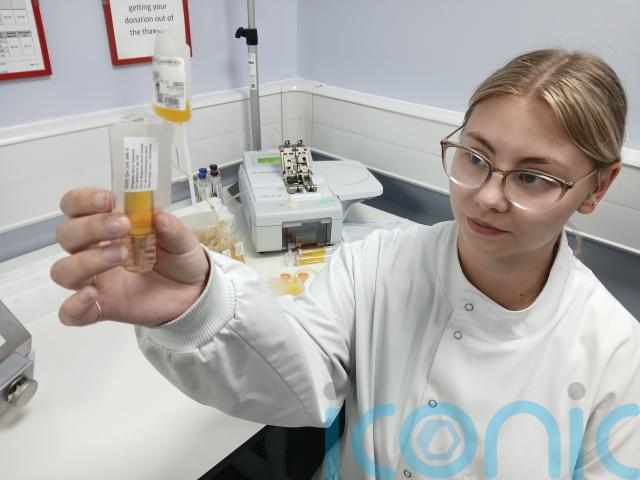
Carolyn, who is under the care of University Hospitals Bristol and Weston NHS Foundation Trust, said: “The eye drops make it more comfortable for me to use my eyes and I feel they have made my vision better.
“Without the drops, my eyes would dry out very quickly. It’s quite wonderful that steps forward like this have been made.”
Using its internal data, NHSBT was able to track down two of the donors whose blood was used to make the eye drops Carolyn has received, and she met them on Monday at Bristol Blood Donor Centre.
Martin Wilson has donated blood about 80 times, describing it as “giving back to society”, while Martin Darwin has donated nearly 60 times, saying it “doesn’t cost anything” and makes him “feel good”.
Describing meeting Carolyn, Mr Darwin said: “It has been an amazing experience to see the difference that the blood you donate has made and how it has helped.
“It’s great to donate but to actually meet a recipient of your own blood and understand how it has changed their life is incredible.”
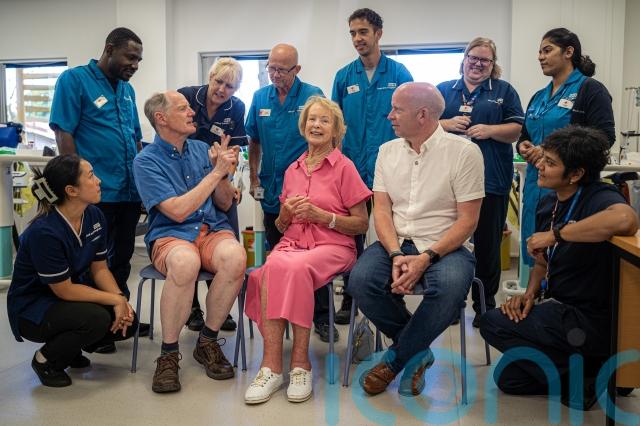
Mr Wilson said: “It’s good to give blood but it’s so nice to meet someone that you have helped directly.
“My blood has been used for normal donations and research and all sorts of things.
“This was special but I don’t care what it’s used for as long as it’s used to help someone.”
Speaking to the two donors, Carolyn added: “I am so grateful to you both. It has been amazing and fascinating to learn about the whole process.
“I’ve had so much help from so many people at the hospital and donors like Martin and Martin. I would just urge people to give blood. I can’t recommend to people enough the difference that it makes.”
To register as a blood donor, visit: blood.co.uk.
Subscribe or register today to discover more from DonegalLive.ie
Buy the e-paper of the Donegal Democrat, Donegal People's Press, Donegal Post and Inish Times here for instant access to Donegal's premier news titles.
Keep up with the latest news from Donegal with our daily newsletter featuring the most important stories of the day delivered to your inbox every evening at 5pm.